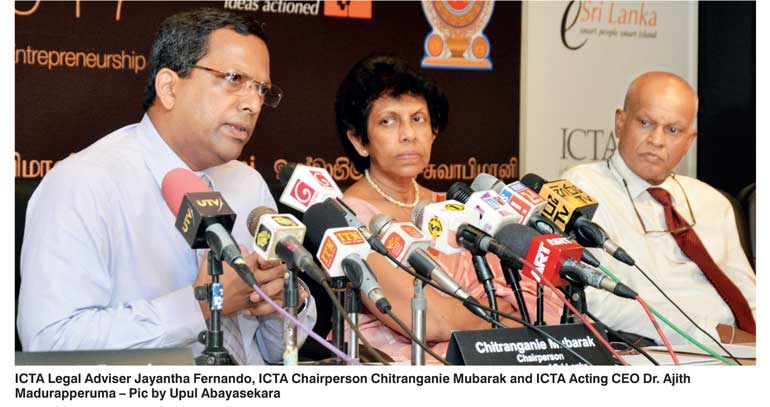Tuesday Feb 17, 2026
Tuesday Feb 17, 2026
Thursday, 16 November 2017 00:18 - - {{hitsCtrl.values.hits}}
 e-Swabhimani Awards 2017 will be held on 30 November, recognising outstanding digital solutions and applications with a substantial societal impact. Organised by the Information and Communication Technology Agency (ICTA) of Sri Lanka for the seventh year running, this year’s event saw over 200 submissions, from established organisations and entrepreneurs to startups and students.
e-Swabhimani Awards 2017 will be held on 30 November, recognising outstanding digital solutions and applications with a substantial societal impact. Organised by the Information and Communication Technology Agency (ICTA) of Sri Lanka for the seventh year running, this year’s event saw over 200 submissions, from established organisations and entrepreneurs to startups and students.
Speaking to the media, ICTA Chairperson Chitranganie Mubarak said that what sets e-Swabhimani apart from similar award programs its focus on the nominees’ capacity to do good for society at large.
“It can be technically brilliant, but if it is not making an impact on the everyday lives of ordinary people, it really wouldn’t be the e-Swabhimani type of award,” she said.
According to Mubarak, e-Swabhimani was introduced in 2009 in line with the World Summits Awards, a global initiative implemented within the framework of the United Nations’ World Summit on Information Society (WSIS) as well as regional awards such as the Manthan Awards South Asia and the mBillionth Award for mobile applications.
“This is a stepping stone to greater things like the World Summit Awards (WSA). Some of our nominees have won at the WSA, too,” she said.
Each country can nominate one submission per category. ICTA picks the winners from the e-Swabhimani Award winners and nominate them for the WSAs.
“At WSA this year, six of our eight nominations made it to the final round. We were second only to Germany who had seven,” said Mubarak.
“There were 400 plus nominations from 98 countries. For Sri Lanka to get to that final round with six nominees speaks volumes of the abilities of our developers,” she added.
ICTA Program Manager Gavashkar Subramaniam said that, in conjunction with the e-Swabhimani Awards’ focus on applications that impact society and people’s livelihoods, ICTA is creating platforms across the country, such as its Smart Social Circles initiative, to raise awareness.
“This year we have targeted 800 villages in the country to create a knowledge society educating them on how to use digital devices and applications to better their lives. We’re looking at 14,000 such programs to be implemented across the country,” he said.
Winners at e-Swabhimani, he said, will be connected to potential private and public stakeholders.
“We don’t want these developers to just to win an award and keep silent. We’re creating an environment for them to take their applications to the next level and improve them for the betterment of the country,” said Subramaniam.
Winners will be encouraged to take their applications to the international market, he said, to generate revenue for the country.
ICTA Acting CEO Dr. Ajith Madurapperuma said ICTA’s goal is to democratise ICT development.
“We all know that digital technology is transforming the world, changing the way we do business. The Government has identified this as a way of taking Sri Lanka to the next stage of development. Right now we’re in the middle income country [category], moving to upper middle income. The Government is relying on ICT to play its role.
“What we’re doing here is to create as much as possible an equal playing field for all our citizens. We don’t want to create elite people. We want to take it to far away villages as well.”
Madurapperuma also spoke of entrepreneurs selling 20 jackfruit seeds at $9.50 and 25g of curry leaves at $3 on eBay. These are among a microcosm of an emerging culture of innovative Sri Lankans, he said, utilising information and communication technology (ICT) to bring about substantial socioeconomic change to themselves and the country at large.
Some companies developed advanced applications that have caught the eye of global investors, including one system that can predict eyesight loss by scanning a patient’s retina which is now funded by a Japanese company. A smart helmet developed by yet another Sri Lankan company has received a million dollar grant for further development.
“There are lots of other upcoming technology projects. This is why ICTA wants to promote these so that it benefits our people and also to take them to the global market,” he added.